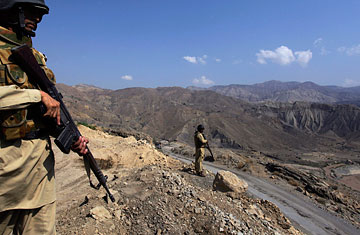
Pakistani paramilitary troops take position in Khajore Kut, part of the South Waziristan tribal region
The term "Obama's war" is usually invoked in reference to Afghanistan, but with every passing day, it seems to apply equally to the conflict in next-door Pakistan. U.S. drone strikes in Pakistan's tribal areas are escalating, partly in response to reports that al Qaeda-linked militants there might be planning terror attacks in Europe and the U.S. Afghanistan-based NATO helicopters also recently mounted an unusual cross-border raid, mowing down dozens of militants (and leaving Pakistan's government fuming about its violated sovereignty). NATO and the U.S. have long invoked a "hot-pursuit" right, claiming that their forces will not end a chase of known combatants at the border. But by that reasoning, NATO and US forces could cross into Pakistan on a near-daily basis. Pakistan reacted angrily to the latest incursion, and on Thursday closed a border crossing into Afghanistan, choking off a key NATO supply route. It's unclear whether the closure came in response to the attacks and how long it would last, but escalating tensions on the border underscore a mounting alarm about Pakistan has the Obama White House breaking an ever-more-visible sweat.
Not even stepped-up drone attacks can win Obama's war in Pakistan, however. In fact, there are several reasons to believe that one is going even worse than the one bogging down roughly 100,000 American troops in Afghanistan. One reason for this concern is the recent news that Pakistan's military leadership has lost faith in its civilian government — a deeply troubling sign of the Pakistani leadership's impotence and lack of popular support. Fortunately, the military seems to have no plans for staging a military coup. Even if it does come to exert more behind-the-scenes political influence that's not a bad thing: the Pakistani Army has long worked closely with the American army: U.S. military officials like David Petraeus and Michael Mullen have cultivated close ties with Pakistan's top general, Ashfaq Parvez Kayani, who in some ways is already the country's de facto leader. But the Obama administration still doesn't want to see too much military interference in Pakistan, where the U.S. has been demonized for supporting anti-democratic military leaders like Pervez Musharraf. It's also not clear how much we can trust the Pakistani military. Despite repeated assurances that they share our desire to vanquish al Qaeda-aligned radicals, Kayani has rebuffed American pleas to move on the key militant stronghold of North Waziristan.
A second reason for growing concern about Pakistan is that the country has just suffered one of the biggest disasters in recent memory. According to Richard Holbrooke, the U.S Special Envoy for Afghanistan and Pakistan, one-fifth of the country is submerged. But despite Pakistan's vital strategic importance, international aid has been appallingly slow to materialize, as radicals exploit the chaos to their advantage. Meanwhile a new Congressional Research Service report warns that the floods have "diverted Pakistani resources and focus away from its struggle with Islamic militants." As Mullen told reporters in Washington, Tuesday: "The floods had a huge impact, because [Kayani's] army had to shift the main effort, if you will, to take care of their people." Worst of all, however, is the massive blow the floods deal to hopes for modernization and prosperity in Pakistan — perhaps the surest way to ensure the country's sanity and stability.
And reason three for concern: An escalated drone campaign may seem like an easy and casualty-free way to inflict pain on our enemies, but they probably aren't the solution to the Pakistan problem. Many strategists worry that over-reliance on Predator attacks could be counterproductive — thanks to public anger amongst Pakistanis over the civilian deaths that often accompany such strikes. And according to Bob Woodward's new book Obama's Wars, outgoing CIA chief Michael Hayden expressed his own worries about the limitations of drone war to incoming president Obama in early 2009.
Finally, there is the war in Afghanistan. The fate of Pakistan and its nuclear arsenal was central to President Obama's thinking when he deployed 30,000 more troops to Afghanistan last year. Obama believes that chaos and free rein for militants across the border presents an unacceptable threat to the stability of Pakistan. But the U.S. military campaign in Afghanistan is making slow headway, and Obama has vowed to begin withdrawing troops from the country next summer. The chances that America's Pakistan problem will be solved by then appear extremely dim. Which leaves Barack Obama still in search of a winning strategy for his real war.
